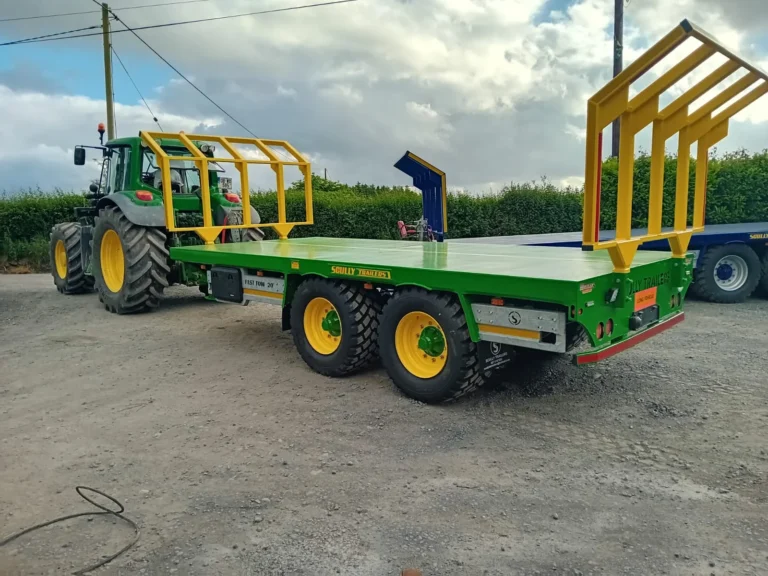Bale trailers are an indispensable asset for farmers and agricultural workers, designed to transport hay, straw, and silage bales efficiently. Whether you’re moving bales from the field to storage or distributing them for feeding, a bale trailer ensures the process is smooth, time-saving, and safe.
What Are Bale Trailers?
Bale trailers are specialized flatbed trailers engineered to carry round or square bales of hay and straw. They are built with features to secure the load and withstand the demands of agricultural operations. Available in various sizes and configurations, bale trailers cater to diverse farm requirements.
Features of Bale Trailers
- Sturdy Construction
Made from high-strength materials like steel, bale trailers are designed to handle heavy loads and rough terrains. - Open Design
The open, flatbed structure allows for easy loading and unloading of bales. - Side Rails and Posts
These features help secure bales in place during transport, reducing the risk of spillage. - Towing Options
Bale trailers can be hitched to tractors or trucks, making them versatile for different types of farms. - Customizable Sizes
Trailers come in various lengths and widths to accommodate different bale quantities and sizes.
Types of Bale Trailers
- Flatbed Trailers
Simple and versatile, these trailers are great for transporting large loads of bales efficiently. - Hydraulic Bale Trailers
Equipped with hydraulic systems, these trailers make loading and unloading easier and faster. - Automatic Bale Stackers
Designed for modern farming, these trailers can automatically pick up, stack, and transport bales, saving labor and time. - Multi-Axle Trailers
Ideal for heavy loads, multi-axle trailers offer better weight distribution and stability during transport.
Advantages of Using Bale Trailers
- Efficiency
Bale trailers streamline the transportation process, reducing the time and effort needed to move bales. - Safety
Features like side rails and secure strapping ensure bales remain in place during transit. - Versatility
These trailers can be used for transporting various types of bales, including hay, straw, and silage. - Cost-Effectiveness
By reducing labor requirements and minimizing trips, bale trailers lower operational costs.
Tips for Choosing the Right Bale Trailer
- Consider Your Load Size
Select a trailer size that matches the number of bales you need to transport regularly. - Look for Durability
Invest in a trailer built from high-quality materials to ensure longevity. - Ease of Use
Features like hydraulic lifts and automatic stackers can simplify the process. - Check Weight Capacity
Ensure the trailer can handle the maximum weight of your typical loads.
Maintenance Tips for Bale Trailers
- Clean Regularly: Remove dirt, debris, and leftover hay to prevent rust and wear.
- Inspect Tires: Check for proper inflation and signs of damage.
- Lubricate Moving Parts: Keep hinges and axles well-lubricated for smooth operation.
- Check for Damage: Regularly inspect the frame and side rails for cracks or bends.
Conclusion
Bale trailers are a cornerstone of efficient farming operations, helping transport hay and straw bales with ease. By selecting the right type of bale trailer and maintaining it properly, farmers can save time, reduce labor, and enhance productivity. Whether you’re managing a small family farm or a large-scale agricultural enterprise, a reliable bale trailer is an investment worth making.

